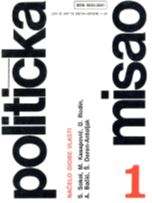Odnos između suverene, zakonodavne i izvršne vlasti u Hegela
The Relationship Between Sovereign, Legislative, And Executive Power According To Hegel
Author(s): Davor RodinSubject(s): Philosophy of Law, Government/Political systems, Politics and law
Published by: Fakultet političkih znanosti u Zagrebu
Keywords: state; power; sovereign power; legislative power; Hegel; philosophy of law;
Summary/Abstract: In his Philosophy of Law Hegel reflects on sovereignty and on legislative and executive power in a critical dialogue with earlier bourgeois theories. He rejects the idea of national sovereignty and the sovereignty of citizenship in order to be able to reject all forms of direct and indirect democracy and all consensual decision and shaping of popular will. Experience connected with these theories convinced Hegel that civil war waged by all people against all others cannot be transcended through a state based on formal law but only through an organically conceived state not threatened by the danger of becoming an expanded area of conflict within civil society and within all forms of democracy in general. War by all people against all other has disposed of in Hegel’s Philosophy of Law according to a new era reinterpretation of the New Testament utopia of love. Hegel’s philosophy of law is a monument of logical utopianism.
Journal: Politička Misao
- Issue Year: XXIX/1992
- Issue No: 01
- Page Range: 29-42
- Page Count: 14
- Language: Croatian

